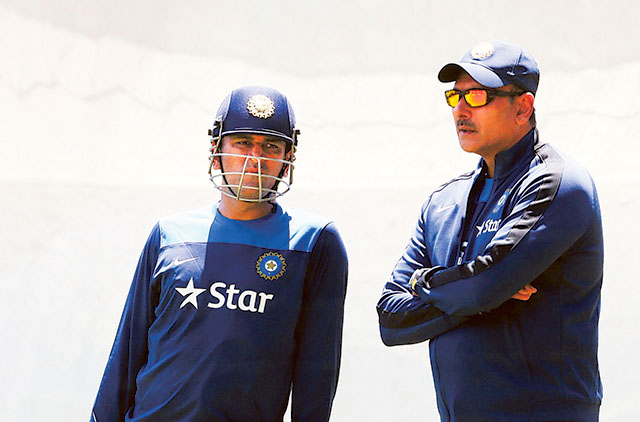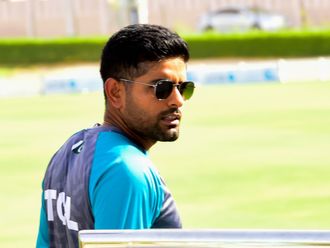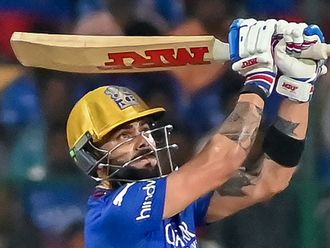Dubai: Roughly seven months ago, midway through a very turbulent tour of England, former Indian cricketer, turned commentator, Ravi Shastri was hurriedly appointed as Director of the Indian team.
The Indian team had simply lost their will to win in England and Shastri’s appointment by the selectors was a last throw of the dice to try and ensure that the team returned to their winning ways.
The selectors also wanted to ensure that Shastri became an effective vehicle between the players and the coach Duncan Fletcher along with his support staff.
A former Indian all-rounder turned commentator Shastri has been rated by his peers as one of the games astute analysts and his presence in the dressing room was welcomed by the players.
The length of his appointment was extended to India’s tour of Australia where they played a four Test series, a tri-series and eventually the World Cup where they bowed out in the semi final.
Since he was appointed as Indian team Director on August 19, 2014, Shastri has presided over the team’s performance in four Tests (2 losses and 2 draws); 24 ODI’s (17 wins; 6 losses and 1 draw) and one T20 (1 loss).
The four and a half month tour of Australia was not without its share of drama, trials, tribulations and achievements.
Stopping in Dubai, on his way home to Mumbai, Shastri shared his experiences on the important aspects.
GULF NEWS: How would you sum up the experience in Australia with this current set of Indian cricketers?
RAVI SHASTRI: I am extremely proud of my entire Indian team. The reason is simple: they have an average age of 26 and virtually negligible experience in Tests and one-day internationals in overseas conditions.
This is nothing compared to teams of the past, but what they have achieved in four and a half months in Australia is not easy. There might not have been many wins, but it still fills me with pride to see what they have achieved.
The experts did not give your team much of a chance in the World Cup based on their performances in the Test and tri-series.
People who have never played the game, or have a deep understanding of the game, are allowed to say what they want. Deep down I knew that this team was ready for the World Cup. And the month’s they spent before the tournament helped immensely. They needed some mental rest after the Tests. Due to the altered schedule, following the unfortunate demise of cricketer Phillip Hughes, we had to play four Tests in one month.
There was very little rest time. This has hardly happened in the history of the game. So we ended up playing four Tests in one month. Despite that to still sustain and have the energy to play the World Cup they way the boys did makes me say that I am proud of each and every individual and this includes my support staff.
Your job was to provide motivation. Did this mean working on the finer areas of the game? What did you focus on?
Nothing specifically. It’s basically the mental aspect and how you play as a team. Individual performances don’t matter to me. That is for the statisticians. They can look into the averages. My job was to focus on how an Indian team performs. Another reason why I am happy with the way things have gone is that I found it tough to single out one individual in this World Cup. Everybody did their bit – we have been brilliant in batting, bowling and fielding.
So basically you just worked on reminding them that they were playing for India?
You can say that. However, no one needs to be reminded that they are playing for India. If he doesn’t know that then he shouldn’t be there, as simple as that
Do you feel the hype created outside the competition with certain superstars needs to be put into perspective. Much of this tour turned out to be the Virat Kohli show. The critics seemed to cross over his achievements on the field to examine his personal life.
My experience with the media helps me to see how people think from the outside. As far as Virat is concerned, he is one of the best players in the world in all formats. No Indian cricketer, or overseas cricketer, has done in Tests what he did in Australia.
Four hundreds (totalling 692 runs) in four Tests is unreal. It’s not just about the runs, it’s about the way he played and the attitude that he displayed. He was combative. He took on the opposition and walked the talk.
It’s easier said than done. You can do it in your own country, but when you play in Australia it’s a different ball game. Virat was magnificent. He’s a player of the future. He will learn from whatever he has done in the World Cup and will come out better.
You have gone through moments when the focus was on your personal life instead of cricket. Comes from being glamorous. What’s your take on it?
No cricketer bothers about what the media and people have to say when they are on that field. No one listens. No one hears. No one reads. The focus is on what each individual has to do on that day.
He has to remember his strengths. Post shows and pre-shows can happen, I have been part of all of them. What happens on the given day in the stadium is what matters for a professional cricketer, or sportsperson. They are not bothered about anything else.
Individual players look for different qualities in their managers. In-depth knowledge of the game is not always required. How did strengthen their resolve?
When it comes to the team it was important that they enjoyed the game, play within the spirit of the game and in a fashion where you want them to win irrespective of whether they are playing Tests or ODI’s. The team must always put itself in a position to win. No other result should be entertained, no matter what surface one is playing on, or what part of the world.
You helped players like Shikhar Dhawan get their edge back. What was your approach?
Creating self belief and making them believe why they were there. If someone is playing for their country then they must have done something to justify that selection.
After a poor report card in the Test and tri-series, the bowling suddenly looked rejuvenated. What happened?
They bowled as a unit. They were made to understand that similar to batting one needs partnerships. The same holds true for bowling. So if one bloke bowls a good over then the other one needs to back it up with an even better one. They learnt to feed off each other’s achievements and energy.
Who are the players that stood out for you?
The Indian cricket team that played in the World Cup stood out for me.
Do you think the post tournament analysis has been cruel? What’s your take on that?
Australia were the far better team on the given day and I give two hoots to what the discussion is after that. People need to fill up their air time - whether it is on TV, radio, or in print. Australia, if you look at them, have depth in batting, bowling and man to man they are a splendid unit. India’s best chance was on the given day.
Everything goes to the back burner on the semi final of a World Cup. Past achievements don’t matter. What matters is how one plays on the day. That’s the opportunity we got. It was a big toss to win but we lost it. Still, there are no excuses. The players learnt a lot and the better team beat us. I have no regrets about that.
You have spent sufficient time with the team – roughly six months. Would you want to spend more time with the boys?
I have never craved for anything in my life, and I have been involved in this game for 35 years. But when you play the game in the way you have - and here I talk about myself - it gets you attached. I have always been a passionate human being when it comes to cricket, playing for the country and representing the BCCI.
Dhoni has now vacated the Test captaincy. Kohli has been identified as the man for the job. Do you think he is the best man to lead India?
Absolutely. The decision was magnanimous. As for Dhoni, he is someone who I rate as an absolute legend in the game, not just for India, but internationally as well. It takes character to retire from Tests the way he did.
I was in the dressing room when he made his announcement and we were all shocked. He did it after the press conference and took all of us by surprise. But he is an absolute champion. He realised that all three formats of the game was tough for him. He also appreciated that there was someone who was ready to take over. Knowing MSD he would have never done that if there wasn’t someone ready for the job.
Is Dhoni the quintessential professional - the man with a plan for every scenario?
There has never been a bigger team player in Indian cricket than Mahindra Singh Dhoni and that’s why he will go down as a legend. He might even go on to become our greatest cricketer ever once he hangs up his boots.
So given his roots and what he has achieved you would say that he has the potential to become a great human being?
He is already a great man. He is his own man. Adjectives are for journalists to use. As far as I am concerned, I said it earlier, he has the potential to go down as India’s greatest ever cricketer.
Does Dhoni’s humility shock you?
All those qualities are needed to go to the level which I have mentioned.
What were the individual good news stories from this tour?
I don’t look at individuals. I look at the Indian team. This squad played a brand of cricket that was aggressive and enjoyable on the field. This was transported back to the viewers and spectators who came to see them play.
Is Ravi Shastri the man who will take this young team into the next era?
Ravi Shastri takes it one step at a time. My job was till the end of the World Cup. I now have a break after six months. But I tell you what – this has given me more enjoyment in these six months than anything that I have done in my lifetime.













